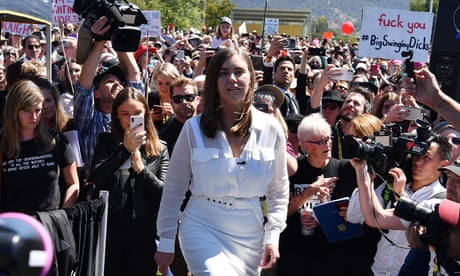Extract from The Guardian
Former Liberal staffer and Grace Tame among those to address tens of thousands of protesters calling for an end to gender-based violence
Last modified on Mon 15 Mar 2021 21.08 AEDT
Brittany Higgins’ voice shook as she addressed the crowd outside Parliament House in Canberra.
She had decided at the last minute to speak to more than a thousand people, mainly women, holding signs calling for justice for women, for sexual assault survivors and for Higgins herself, who has alleged she was raped by a colleague inside Parliament House.
That allegation is currently subject of an ongoing police investigation although no charges have been laid.
The #March4Justice protests were sparked in part by Higgins’ rape allegation and a now-deceased woman’s allegation that she was raped by attorney general Christian Porter in 1988 - a claim he has strenuously denied.
“I was raped inside Parliament House by a colleague and for so long it felt like the people around me did not care about what happened because of what it might mean for them,” Higgins said.
“It was so confusing because these people were my idols. I had dedicated my life to them. They were my social network, colleagues and my family. Suddenly they treated me differently. I was not a person who had just gone through a lot of changes, I was a political problem.”
Higgins said she has been unable to find work. Her partner left his Canberra job after the story broke, attributing this to fear of repercussions. It had been an “extremely difficult, few weeks”, she said.

“I watched as the prime minister of Australia publicly apologised to me through the media, while privately the media team actively undermined and discredited my loved ones,” Higgins said.
Scott Morrison told parliament he had no knowledge of any backgrounding “and would never instruct that”.
Higgins continued: “I tuned into question time to see my former bosses, people that I had dedicated my life to, downplay my lived experience.”
She said she woke up to daily news updates with new information about her own alleged experience.
“Details that were never disclosed to me by my employers, information that would have helped me as questions that have haunted me for years.”
Organisers of the march carried a petition signed by nearly 70,000 people calling for action to better protect women from abuse and harassment. They wanted to present it to the prime minister but Scott Morrison refused to meet them. He offered a meeting in his office, which was refused.
As Higgins addressed the crowd in Canberra, another woman took the stage in Hobart. Grace Tame, the Australian of the Year, was sexually abused as a teenager by a school teacher and campaigned to change the law in Tasmania to allow survivors of sexual abuse to speak and tell their story. The change now gripping Australia – the need that so many women have to speak and be heard – started in Hobart, Tame said.
“When an issue that has been shrouded in darkness for such a long time is suddenly thrust into the light, there’s widespread shock and disbelief over how something so evil could happen, and not just happen but happen so ubiquitously,” Tame said.
“And the answer is plain and simple – silence. Evil thrives in silence. Behaviour unspoken, behaviour ignored, is behaviour endorsed.”
At rallies across Australia women marched and women spoke. In Sydney, 10,000 people listened to the author Jess Hill describe a tactic used in family and sexual violence cases: deny, attack and reverse the victim and the offender.
“They reverse it so it looks like the alleged perpetrator is the victim,” she said.
In Melbourne, before more than 5,000 people in Treasury Gardens, the former Liberal party MP Julia Banks said she had initially been afraid to speak at the rally for fear of repercussions.
“This is our collective voice,” she said. “It is a roar. It is a roar which says to the men in power, if you turn your backs on women we will turn our backs on you.”
A plane flew over the crowd towing a banner that read: “Women vote too.”
The Queensland premier, Annastacia Palaszczuk, attended the march in Brisbane.
At every rally, in every city, women carried signs saying: “I believe her”, “I stand with her”. Some carried signs for Sarah Everard, a 33-year-old woman allegedly murdered in London and spoke of the protests in that city. In Melbourne, a woman carried a sign saying: “I have been silenced by an NDA.”
Another woman, who asked to be referred to as Jo, held a sign that said: “I didn’t report my assault … because I knew I wouldn’t be believed. Stop proving me right.”
Belinda Payne, a Yorta Yorta woman, told Guardian Australia she had felt conflicted about attending the march.
“I work with a lot of Indigenous women, I am an Indigenous woman, and their stories are never heard, they are never believed,” Payne said.
“I’m still here because I think every step is important. As much as it’s so tragic, she was supported by a lot of privileged people and a lot of Indigenous women, they are not supported by anyone when they go through this. I want justice for all Aboriginal women as well.”
Morrison told parliament the protests were a “triumph of democracy”.
“It is good and right that so many are able to gather here in this way, whether in our capital or elsewhere, and to do so peacefully to express their concerns and their very genuine and real frustrations,” he said.
“This is a vibrant liberal democracy. Not far from here, such marches – even now – are being met with bullets but not here in this country. This is a triumph of democracy when we see these things take place.”
No comments:
Post a Comment